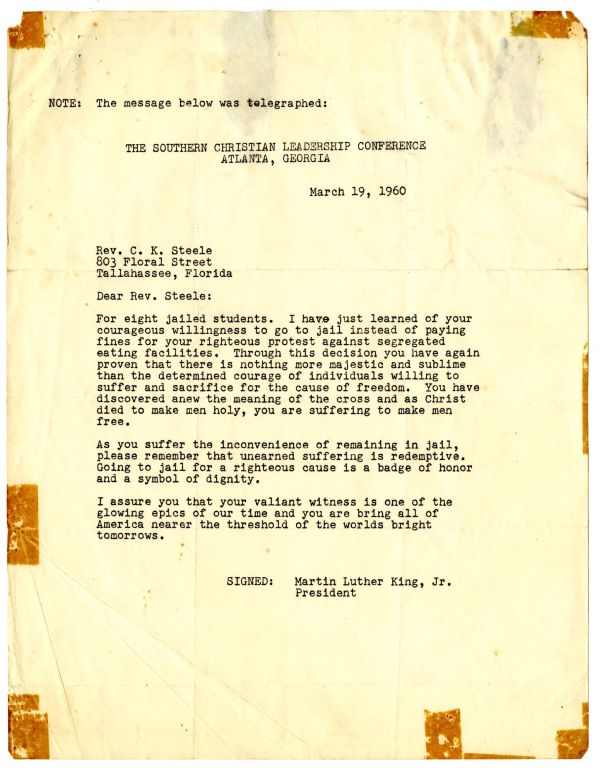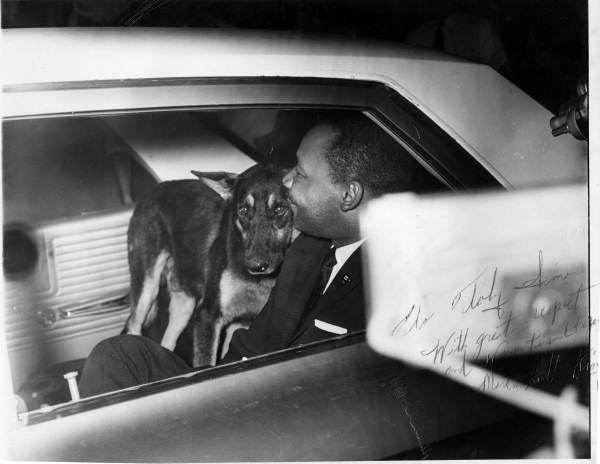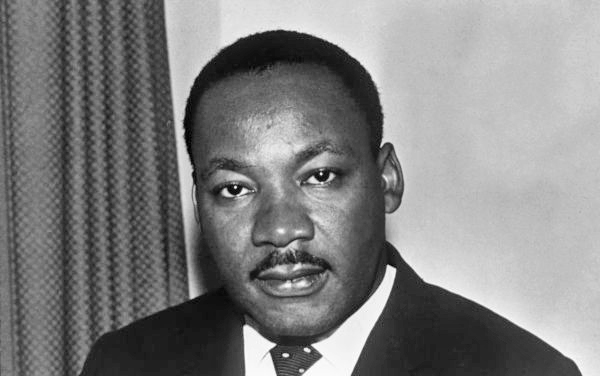Description of previous item
Description of next item
Dr. Martin Luther King Jr. in Florida
Published April 4, 2018 by Florida Memory
April 4, 2018, marks the 50th anniversary of the assassination of Dr. Martin Luther King Jr., a towering figure in the history of civil rights activism. Florida Governor Rick Scott directed the flags on public buildings throughout the state to be flown at half-mast and proclaimed the day as Dr. Martin Luther King Jr. 50th Anniversary Remembrance Day.
Reactions to Dr. King’s killing in 1968 were swift and widespread, as his many followers took to the streets to vent their frustration over the loss of such a powerful force for peaceful change. For many civil rights activists in Florida, this loss was personal. King had not only inspired them but in some cases had directly supported or even personally participated in their mission to banish segregation from the Sunshine State.
One example of this is the notice Dr. King took of a group of African-American students who were jailed in 1960 for staging a sit-in at the Woolworth’s lunch counter in Tallahassee. Patricia and Priscilla Stephens, students at Florida A&M University and founders of the Tallahassee chapter of the Congress of Racial Equality (CORE), were instrumental in organizing the protests and were among the students arrested. They were charged with civil disobedience and ordered to pay a $300 fine or spend 60 days in jail. Eight students, including the Stephens sisters, chose to go to jail rather than pay the fine, underscoring their assertion that their cause was just.
This “jail-in” attracted significant media attention, and supportive letters and telegrams began arriving from across the nation, including a telegram from Dr. King. Using local Tallahassee civil rights activist Rev. C.K. Steele as an intermediary, Dr. King urged the students to “remember that unearned suffering is redemptive. Going to jail for a righteous cause is a badge of honor and a symbol of dignity.” Here is the complete message, one of many digitized as part of the Stephens Sisters Jail-In Papers on Florida Memory:

Transcript of a telegram from Dr. Martin Luther King Jr. to Rev. C.K. Steele of Tallahassee, conveying a message to the eight students jailed in Tallahassee for staging a “sit-in” at the segregated Woolworth’s lunch counter in 1960.
Dr. King was more directly involved in a series of protests in mid-1964 in St. Augustine, which was then preparing to celebrate its 400th anniversary. Racial unrest had been on the upswing for over a year, stemming from ongoing segregation in the city, and especially from local officials’ near-complete exclusion of African-Americans from the celebration planning process. The Southern Christian Leadership Conference (SCLC) began directly supporting local civil rights activists in St. Augustine in the spring of 1964, with Dr. King himself arriving in May to rally the protesters. He was arrested on June 11 along with fellow civil rights leader Ralph Abernathy when the two men requested service at a segregated restaurant. King was subsequently moved to the Duval County jail, where he reportedly said to one African-American employee, “Hello, sister. I’ve been in fifteen jails, but this is the first time that I have been treated like a hog.” King was eventually released, but he was arrested at least twice more that same month during his stay in St. Augustine. The protests King and the SCLC helped organize were not in vain. The episode helped galvanize support for the Civil Rights Act of 1964, which was before Congress at that moment, and was signed into law by President Lyndon Johnson on July 2.

Dr. Martin Luther King Jr. in the back of a police car after facing the St. Johns County grand jury in June 1964.

St. Augustine’s arrest records for June 30, 1964. The entry for Dr. King’s arrest is located near the bottom of the page.
When Dr. King was assassinated on April 4, 1968, reactions in Florida ranged from quiet memorials to passionate demonstrations and rioting. Local and state officials acted quickly to restore the peace, but they also gave a nod of respect to King’s fervent belief in the power of peaceful protest. Governor Claude Kirk issued a statement directing the flags on public buildings in Florida to be flown at half-mast for two days to honor the passing of both Dr. King and a Tallahassee man who died when a firebomb was thrown into his family’s grocery store during tense demonstrations the day before. “Every Floridian has a choice,” Kirk wrote. “It is whether to turn to the advocates of violence and insurrection for leadership, or to renew our commitment to equal opportunity and racial justice through peaceful means.”

News release from Governor Kirk asking Floridians to display flags at half-mast from April 5-7, 1968, in memory of Martin Luther King Jr.
King’s legacy extends far beyond the annual celebration of his birthday in January or the many streets and highways named in his honor. For Floridians, including both veterans of the civil rights movement and young people just now learning about its history, Dr. Martin Luther King Jr. still stands out as an example of tireless leadership and determination to fulfill the promise of equality and freedom for all Americans.
Cite This Article
Chicago Manual of Style
(17th Edition)Florida Memory. "Dr. Martin Luther King Jr. in Florida." Floridiana, 2018. https://www.floridamemory.com/items/show/332828.
MLA
(9th Edition)Florida Memory. "Dr. Martin Luther King Jr. in Florida." Floridiana, 2018, https://www.floridamemory.com/items/show/332828. Accessed February 12, 2026.
APA
(7th Edition)Florida Memory. (2018, April 4). Dr. Martin Luther King Jr. in Florida. Floridiana. Retrieved from https://www.floridamemory.com/items/show/332828

 Listen: The Bluegrass & Old-Time Program
Listen: The Bluegrass & Old-Time Program